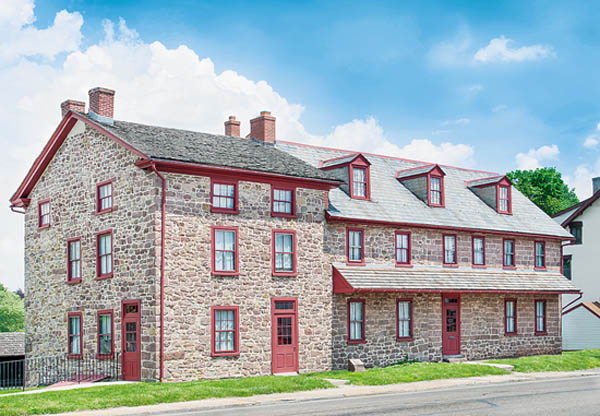Center For Pennsylvania German Studies To Open In Trappe
Historic Dewees Tavern Is On Main Street
Immigration and settlement are highlighted in the first gallery, which features a German immigrants chest from 1744 and artifacts associated with the Ephrata Cloister, including a writing desk, hanging cupboard, and Martyrs Mirror. Quaker, Dutch, and Swedish objects are also included to represent the cultural diversity of southeastern Pennsylvania. The second gallery focuses on Pennsylvania German furniture and features stunning examples with painted, carved, or inlaid decoration. There is a magnificent Lancaster high chest, a desk and bookcase, and a walnut tea table that descended in the family of Jacob and Anna (Brackbill) Neff of Strasburg, who married in 1755. Also on view is an inlaid tea table from the Philadelphia area and a painted chest from the Oley Valley made for Maria Griesemer that is on loan from a direct descendant.
The third gallery highlights furniture from the Mahantongo Valley, including a painted chest decorated with images of praying children, copied from printed fraktur, and painted chest of drawers. There is also a rare Mahantongo Valley kitchen dresser with a display of redware and woodcarvings by Wilhelm Schimmel, who emigrated from Germany about 1860 and settled in the Cumberland Valley of central Pennsylvania. Fraktur and textiles are also displayed here, including a birth and baptismal certificate made by schoolmaster Conrad Gilbert for his nephew, Matthias, and a sampler made by Elisabeth Schrack of Trappe in 1804. Paintings are the focus of the fourth gallery, including works by noted Pennsylvania German artists such as Jacob Eichholtz, Charles Hofmann, and David Ellinger. Of special note is a stunning landscape of the Montgomery County almshouse overlooking the Schuylkill River; it descended in a local Trappe family. There is also a Berks County painted chest with black unicorns, dated 1784 and made for Catarina Zumbro of Bern Township.
The fifth gallery, reserved for changing exhibitions, is located in the oldest part of the tavern, built in the 1740s and remodeled circa 1800. The inaugural special exhibition, Roots: Ursinus College and the Pennsylvania Germans, is being organized in honor of the colleges 150th anniversary. From its founding in 1869 to the present day, Ursinus has had deep roots in the local Pennsylvania German community. The first half of the exhibition examines the schools origins; until 1900, at least 80 percent of the student body was Pennsylvania German. The second half highlights the colleges rich collection of Pennsylvania German artifacts, books, and manuscripts stemming from its 1968 acquisition of the Pennsylvania Folklife Society. New research on these objects has turned up many new discoveries, such as a sgraffito plate signed by Berks County potter Solomon Grimm. Ursinuss entire fraktur collection, which numbers more than 125 pieces, will be made available in a digital fraktur archive that will go live this fall at www.digitalcommons.ursinus.edu/fraktur.
The Center for Pennsylvania German Studies opens to the public on the weekend of Friday, Saturday, and Sunday, Sept. 20, 21, and 22. Guided tours are also available of the Henry Muhlenberg House and the Speakers House (home of Frederick Muhlenberg), both within walking distance of the Dewees Tavern.
A full-color, 116-page catalogue for the Roots exhibition will be available for sale at $25 a copy. Included will be many photos of the PA Folklife Society collection.
The Dewees Tavern is located at 301 W. Main St., Trappe, Pa.
For more information, visit www.HistoricTrappe.org.
Photographs by Gavin Ashworth.
















